Abstrakt
In my paper I will discuss the career of, a director born in 1942 in Nis in Yugoslavia, whose career, spanning over forty years and Yugoslavia, West Germany and Serbia, excellently illustrates the concepts of independent and transnational cinema and their interface. Žilnik’s career well illustrates the advantages and pitfalls of “independent filmmaking”, especially in the context of Eastern Europe. Hence, in my paper, I will use his case to examine this concept, drawing on Marx and Marxist thought, such as the critique of the “culture industry” by Horkheimer and Adorno and the concept of “critical media” by Christian Fuchs, and the history of Eastern Europe and its cinema, with its figure of “artist-dissident” and the specific case of Yugoslavia. My main point is that there is no “independent cinema” in absolute terms; cinema can only be independent from something, hence ‘independent cinema’ means different things in different cultural contexts.Bibliografia
S. Macdonald, A Critical Cinema: Interviews with Independent Filmmakers, University of California Press, Berkeley 1988, p. 1.
J. Hillier, American Independent Cinema: A Sight and Sound Reader, British Film Institute, London 2001.
E. Mazierska, Jerzy Skolimowski: The Cinema of a Nonconformist, Berghahn Books, Oxford 2010, p. 21.
G. Kirn, “From the Primacy of Partisan Politics to the Post-Fordist Tendency in Yugoslav Self-Manage¬ment Socialism,” [in:] Post-Fordism and its Discontents, ed. G. Kirn, Jan van Eyck Academie, Maastricht 2010.
J.B. Allcock, Explaining Yugoslavia, Hurst and Co., London 2000, pp. 76‒78.
G. Kirn, From the Primacy of Partisan Politics...
P. Levi, Disintegration in Frames: Aesthetics and Ideology in the Yugoslav and Post-Yugoslav Cinema, Stanford University Press, Stanford 2007, p. 15.
G. Kirn, “New Yugoslav Cinema – A Humanist Cinema? Not Really,” [in:] Surfng the Black: Yugoslav Black Wave Cinema and Its Transgressive Moments, ed. G. Kirn et al., Jan van Eyck Academie, Maastricht 2012, p. 17.
D. Beganović, “Changing Fates: Te Role of the Hero in Yugoslav Cinema in the Early and Late Sixties,” [in:] Retracing Images: Visual Culture after Yugoslavia, eds. D. Šuber, S. Karamanić, Brill, Leiden 2012.
T. Adorno, “The Autonomy of Art,” [in:] The Adorno Reader, ed. B. O’Connor, Blackwells, Oxford 2000, p. 256.
M. Salokannel, “Cinema in Search of its Authors: On the Notion of Film Authorship in Legal Dis-course,” [in:] Film and Authorship, ed. V. Wright Wexman, Rutgers University Press, New Brunswick 2003, pp. 158‒160.
D. Kideckel, “The unmaking of an East-Central European working class,” [in:] Postsocialism: Ideals, Ideologies and Practicies in Eurasia, ed. C.M. Hann, Routledge, London 2002, p. 115.
B. Ćurčić, “The Paradigm of Fragility of the Workers’ Issue in (post-) Socialist Yugoslavia: Elementary School of Capitalism – On Želimir Žilnik’s Latest Film Actions,” [in:] For an Idea – Against the Status Quo: Analysis and Systematization of Želimir Žilnik’s Artistic Practice, eds. B. Ćurčić et al., Playground produkcija, Novi Sad 2009, pp. 193‒194.
B. Dimitrijević, “Concrete Analysis of Concrete Situations: Marxist Education According to Želimir Žilnik,” Aferall 25, http://www.aferall.org/journal/issue.25/concrete-analysis-of-concrete-situ-ations-marxist-education-according-to-elimir-ilnik, 2010 (accessed: May 15, 2012).
D. Harvey, Feral Capitalism Hits the Streets: Reading Marx’s Capital with David Harvey (David Harvey blog), http://davidharvey.org/2011/08/feral-capitalism-hits-the-streets, 2011 (accessed: May 22, 2012).
Licencja
Copyright
© 2013 Uniwersytet im. Adama Mickiewicza w Poznaniu
OPEN ACCESS
